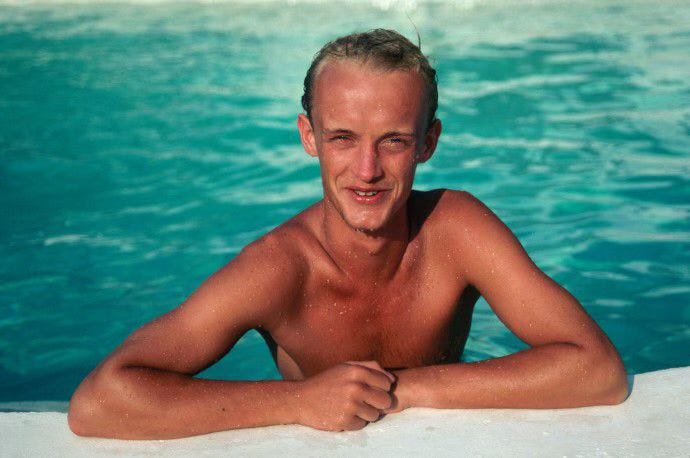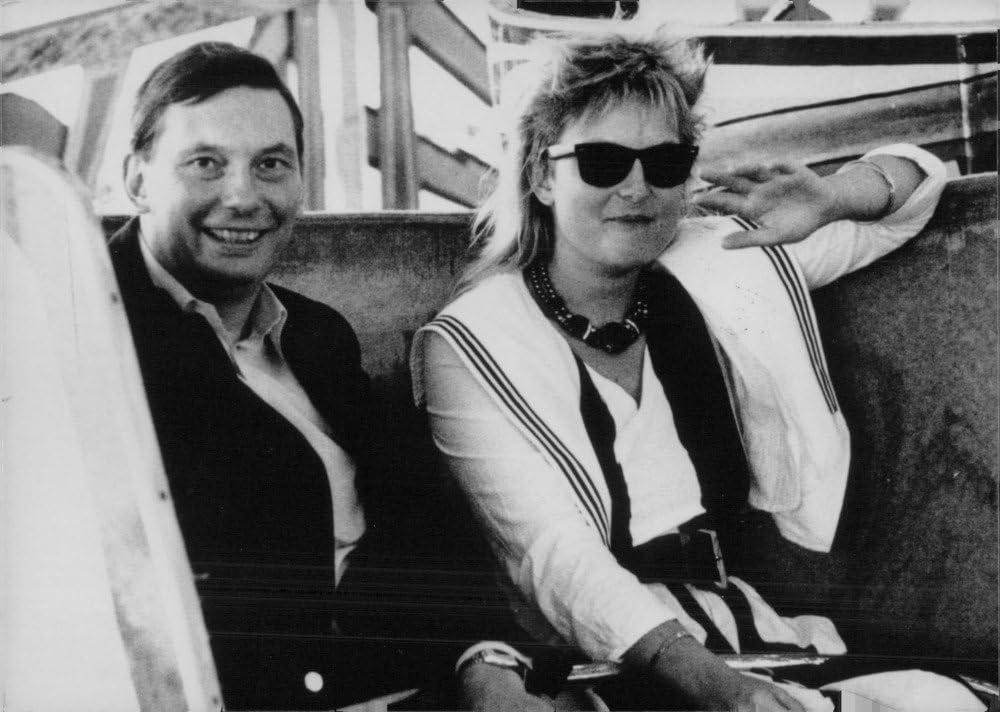
Gottfried von Bismarck, born into the illustrious Bismarck family, lived a life marked by privilege and numerous complexities. Educated at Oxford University, he was known for his charismatic presence and vibrant social life. Despite his aristocratic background, Gottfried faced personal challenges, including struggles with substance abuse.
Gottfried’s story is one of contrasts: a mix of historical legacy, personal battles, and public scrutiny.
Table of Contents: Early Years / Oxford / 1986 accident / Career and Achievements / Struggles with Addiction / 2006 incident / Moving On
If you aren’t subscribed yet, hit the subscribe button below to receive the Adorable Stories every weekend, directly in your inbox:
Early years
Gottfried Alexander Leopold Graf von Bismarck-Schonhausen was born on September 29th, 1962, in Uccle, Belgium.
Gottfried was a member of the prominent Bismarck family, known for their historical influence in Germany: he was the great-great-grandson of Otto von Bismarck, the first Chancellor of the German Empire.
His father, Prince Ferdinand von Bismarck, was a diplomat, while his mother, Elisabeth Lippens, came from Belgian nobility.
Gottfried was also the grandson of Otto, Prince von Bismarck, a diplomat at Germany’s embassy in pre-WW2 London until a feud with Third Reich foreign minister Joachim von Ribbentrop abruptedly ended his career.
Oxford
As a talented young scholar, Gottfried had studied first in Germany and then at what he described as “an aristocratic Borstal” in Switzerland, and later briefly worked at the New York Stock Exchange before going up to Christ Church, Oxford.
There, he pursued a degree in Philosophy, Politics, and Economics (PPE), a program renowned for producing influential political leaders (at least in England).
At Oxford, he became known not just for his academic pursuits, but also for his vibrant social life, hosting elaborate parties that quickly became the talk of the town: the day he arrived at Oxford in 1983, he hosted a dinner at which the severed heads of two pigs were placed at either end of the table.
Gottfried was a member of the exclusive Piers Gaveston Society, “noted for its predilection for rubber wear and whips, which he embellished with his androgynous apparel and lipstick”, as well as the prohibitively expensive Bullingdon Club, known for its members’ wealth and self-destructive alcohol binges, alongside friends like Darius Guppy.
He only managed to complete a third of his PPE degree.
1986 accident
Gottfried’s university career ended in catastrophe in June 1986, when his friend Olivia Channon — the 22-year-old daughter of Paul Channon, a prominent British politician, then one of Margaret Thatcher’s cabinet ministers— was found dead on his bed, the victim of a drink and heroin overdose.
To celebrate the end of their finals, Gottfried and Olivia had taken part in a drinking bout involving excessive amounts of champagne, Black Velvet and sherry, before she overdosed on heroin.
At the Police inquest, her cousin Sebastian Guinness described how he and other revellers had repaired to Gottfried’s bottle-filled rooms, where Olivia was found dead the following morning.
Gottfried himself was charged with possessing cocaine and amphetamine sulphate and was later treated at a GBP 770-a-week addiction clinic in Surrey.
Following Olivia Channon’s funeral — at which he was said to have “wept like a child” — Gottfried was ordered home to the family castle near Hamburg by his father.
His removal from Oxford was so abrupt that he was not given time to settle his bills: Prince Ferdinand sent a servant to Oxford who did the rounds of Gottfried’s favoured pubs, restaurants and his tailor bearing a chequebook.
This event garnered significant media attention and would later cast a long shadow over his life.
Albeit Gottfried was not charged in connection with Olivia Channon’s death (her passing was ruled an accidental heroin overdose), the tragedy highlighted the darker side of the privileged social circles they were part of, and it marked a turning point for Gottfried, bringing his own struggles with substance abuse into sharper focus.
The incident affected him deeply, contributing to his public persona and personal challenges for years to come.
“My days of living it up are all over. This past week has just been too much”
Although he was reported to be leaving the UK to finish his studies at a German university, once in Germany his father ordered him to be treated again for alcoholism at a German clinic.
Gottfried admitted that his role in the affair had brought disgrace on the family name: five years later he told friends that there were still people who would not speak to his parents on account of it, and who told his mother that she had “a rotten son”.
Career and Achievements
After leaving Oxford, Gottfried von Bismarck ventured into the world of finance and real estate. He initially worked in investment banking, gaining experience at a few major firms in London.
In the reunified Germany, Gottfried managed several telecoms businesses and, armed with a doctoral thesis on the East German telephone system, oversaw the sale of companies formerly owned by Communist East Germany to the private sector.
Later, Gottfried shifted his focus to real estate development. He worked with several high-profile projects, leveraging his aristocratic connections to forge partnerships and secure financing and investments.
By the late 1990s Gottfried decided to leave Europe and move to Los Angeles, where he was working for Telemonde, Kevin Maxwell’s troubled telecoms firm based in America, with responsibility for developing the business in Germany: the company collapsed in 2002 with debts of GBP 105 million.
Gottfried eventually returned to London, where he became chairman of the investment company AIM Partners, dabbled in film production and promoted holidays to Uzbekistan.
Despite controversies and a lifestyle often scrutinized by the media, Gottfried’s professional endeavors demonstrated a certain degree of adaptability and his occasional business acumen.
Struggles with Addiction
Gottfried von Bismarck’s life was overshadowed by struggles with drug addiction. Despite his privileged background and professional responsibilities and accomplishments, he faced ongoing battles with substance abuse all his life. His addiction was a subject of ongoing public scrutiny, contributing to a tumultuous personal life.
Friends and family were concerned about the impact his addiction had on his health and well-being.
Never concealing his homosexuality, Gottfried continued to appear in public in various eccentric items of attire.
At parties he would appear in exotic designer frock coats with matching trousers and emblazoned with enormous logos. Flitting from table to table at fashionable London nightclubs, he was said to be as comfortable among wealthy Eurotrash as he was on formal occasions calling for black tie.
2006 incident
Although described personally as quiet, polite and impeccably mannered, Gottfried continued to live the high-life, hosting riotous all-night parties for his (predominantly gay) friends at his GBP 5 million flat off Sloane Square, in London.
It was at one such event, in August 2006, that Gottfried encountered tragedy for a second time when one of his male guests, a young man named Anthony Casey, died after falling from the roof garden during a party.
The coroner’s report had found no alcohol in Anthony Casey’s body, but did find a significant amount of cocaine.
While Gottfried was not arrested, he was questioned as a witness.
Moving On
In early 2007, Gottfried decided to close the previous chapter of his life for good, sell his Sloane Square apartment and discreetly moved in with an old friend on Portobello Road, Notting Hill.
He had been heard to say that he was deeply saddened that his life had brought so much shame upon his family.
Friends were relieved he was making such a concerted effort to clean up his life and that he was being helped to start afresh in a new environment.
On July 2nd, 2007, Gottfried was found dead in his almost empty Sloane Square flat, which was still in the process of being sold.
He had died three days earlier and was only 44 years old.
An inquest into the circumstances was opened on July 6th, 2007: Sebastien Lucas, the pathologist who carried out the post-mortem examination, said that Gottfried had been injecting cocaine on an hourly basis on the day before his death, and that his body contained the highest level of cocaine that he had ever seen, as well as morphine; he was also found to have liver damage, and had contracted hepatitis B, hepatitis C, and HIV.
—Alberto @
Do you know anyone who would love to read this Adorable Story? Show your support by sharing Adorable Times’ Newsletter and earn rewards for your referrals.








